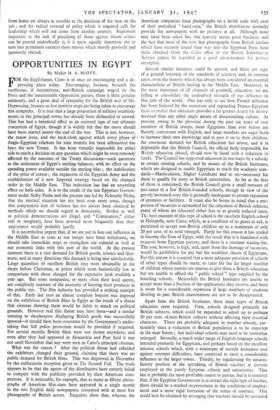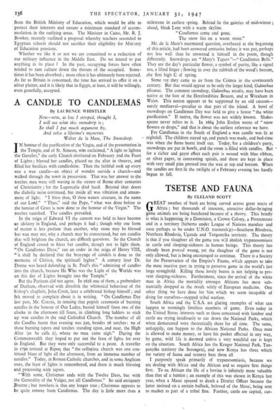OPPORTUNITIES IN EGYPT
By Major D. A. SCOTT.
FOR the Englishman, Cairo is at once an encouraging and a de- pressing place today. Encouraging, because, beneath the vociferous, if intermittent, anti-British campaign waged by the Press and the innumerable Opposition parties, there is little genuine animosity, and a great deal of sympathy for the British way of life. Depressing, because so few positive steps are being taken to encourage this sympathy. It is true that a large proportion of military establish- ments in the principal towns has already been disbanded or moved. This has had a beneficial effect as an outward sign of our ultimate evacuation of Egypt, though it is widely felt that the move should have been started nearer the end of the war. This is not, however, the major issue, and the back-cloth against which every phase of Anglo-Egyptian relations for nine months has been silhouetted has been the new Treaty. It has been virtually impossible for either side to reach a decision on any question which might be even remotely affected by the outcome of the Treaty discussions—such questions as the settlement of Egypt's sterling balances, with its effect on the spending power available outside the sterling bloc ; the stabilisation of the price of cotton ; the expansion of the Egyptian Army and the establishment of a new Imperial strategy based on the changed order in the Middle East. This indecision has had an unsettling effect on both sides. It is to the credit of the late Egyptian Govern- ment under Sidky Pasha and the present one led by Nokrashy Pasha, that the internal situation has not been even more tense, though this comparative lack of violence has not always been obtained by methods which Ave should regard as democratic. Strikes as well as political demonstrations are illegal, and " Communists," either real or imaginary, have been arrested more frequently than their importance would probably justify.
It is nevertheless urgent that, if we are not to lose our influence in the Middle East as soon as our troops have been withdrawn, we should take immediate steps to strengthen our cultural as well as our economic links with this part of the world. At the present moment there is a vast demand for British goods, science and liter- ature, and in many directions this demand is being met satisfactorily. Large quantities of excellent British toys were obtainable in the shops before Christmas, at prices which seem fantastically low in comparison with those charged for the expensive junk available a year ago. But some companies, or more often their local agents, are completely unaware of the necessity of keeping their products in the public eye. The film industry has provided a striking example of this. Early last year an almost complete boycott was imposed on the exhibition of British films in Egypt as the result of a threat that cinemas showing them would be liable to attack on political grounds. However real this threat may have been—and a similar warning to shopkeepers displaying British goods was successfully ignored—it should have been overcome by the Government's under- taking that full police protection would be provided if required. For several months British films were not shown anywhere, and even after they had appeared in Alexandria and Port Said it was not until November that any were seen in Cairo's principal cinemas.
What was the reason ? After the political threat had subsided the exhibitors changed their ground, claiming that there was no public demand for British films. This was disproved in December by the enthusiastic reception given to The Seventh Veil. The truth appears to be that the agents of the distributors have entirely failed to compete with the publicity provided by their American com- petitors. It is noticeable, for example, that as many as fifteen photo- graphs of American film-stars have appeared in a single month in the two English daily newspapers, compared with at most five photographs of British actors. Enquiries show that, whereas the
American companies issue photographs on a lavish scale with each of their periodical " hand-outs," the British distributors normally provide the newspapers with no pictures at all. Although none may have been asked for, this scarcely seems good business, and the fact that most of the very few photographs from British studios which have recently found their way into the Egyptian Press have been obtained from the Cairo office of the British Information Service cannot be regarded as a good advertisement for priva:e enterprise.
Several similar instances could be quoted, and there are sign of a general lowering of the standards of courtesy and, in extreme cases, even the honesty which has always been considered an essential characteristic of British trading in the Middle East. Moreover, in the most important of all channels of goodwill, education, we are failing to consolidate the undoubted strength of our influence in this part of the world. One has only to see how French influence has been fostered by the numerous and expanding Franco-Egyptian /yces to realise that education provides a far greater return for money invested than any other single means of disseminating culture. At present, owing to the presence during the past six years of vast numbers of British troops, more Egyptians than ever before are fluently conversant with English, and large numbers are eager both.
• to increase their own knowledge and to pass it on to their children. An enormous demand for British education has arisen, and it is deplorable that the British Council, the official body responsible for British education abroad, should now be faced with a reduction in funds. The Council has supported education in two ways: by a subsidy to certain existing schools, and by means of the British Institutes, which are designed to enable Egyptians to reach the academic stan- dards—Matriculation, Higher Certificate and so on—necessary for them to qualify for entry to British universities. As far as the first of these is concerned, the British Council gives a small measure of assistance to a fey; British-founded schools, though in view of the greatly increased costs this is generally inadequate to permit expansion of premises or facilities. It must also be borne in mind that a pro- portion of vacancies is earmarked for the education of British subjects, many of whom are educated either free or at greatly reduced rates. Thy best example of this type of school is the excellent English school at Heliopolis, near Cairo, which, as a condition of its grant-in-aid, is permitted to accept non-British children up to a maximum of only 20 per cent, of its total strength. Partly for this reason it has tended to become the Eton of Egypt, with the result that it is inundated with requests from Egyptian parents, and there is a constant waiting-list. The cost, however, is high, and, apart from the shortage of vacancies, would be prohibitive for any but the wealthier classes of Egyptians. For this reason it is essential that a more adequate provision of schools of other types should be made, to cater for the far larger number of children whose parents are anxious to give them a British education but are unable to afford the " public school " type supplied by the boarding schools. Meanwhile the British Institutes are unable to accept more than a fraction of the applications they receive, and there is room for a considerable expansion if large numbers of students desiring to pass British examinations are not to be disappointed.
Apart from the British Institutes, three main types of British education seem required. First, schools designed primarily for British subjects, which could be expanded to admit up to perhaps 50 per cent. of/non-British subjects without affecting their essential character. These are probably adequate in number already, par- ticularly since a reduction of British population is to be expectep in the near future ; but individual schools may need to be somewhat enlarged. Secondly, a much wider range of English-language schools intended primarily for Egyptians, and perhaps based on the excellent mission schools which, with a minimum of outside assistance and against constant difficulties, have contrived to exert a considerable influence in the larger towns. Thirdly, by regularising the unsatis- factory position of the sprinkling of British teachers at present employed in the purely Egyptian schools and universities. This last is probably the most profitable course to pursue, but it is essential that, if the Egyptian Government is to attract the right type of teacher, there should be a marked improvement in the conditions of employ- ment and a more rigid limitation of the terms of contract. This could best be obtained by arranging that teachers should be seconded
from the British Ministry of Education, which would be able to protect their interests and ensure a minimum standard of accom- modation in the outlying areas. The Minister in Cairo, Mr. R. J. Bowker, recently outlined a proposal whereby teachers seconded to Egyptian schools should not sacrifice their eligibility for Ministry of Education pensions.
Whether we like it or not we are committed to a reduction of our military influence in the Middle East. Do we intend to put anything in its place ? In the past, occupying forces have often tended to ram culture down the throats of the occupied. Some- times it has been absorbed ; more often it has ultimately been rejected. As far as Britain is concerned, the time has arrived to offer it on a silver platter, and it is likely that in Egypt, at least, it will be willingly, even gratefully, accepted.



































 Previous page
Previous page